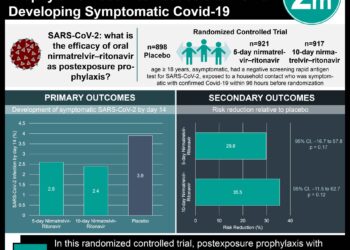Identification of a genetic susceptibility locus in patients with severe Covid-19
1. A 6-gene cluster at the locus 3p21.31 was determined to be related to Covid-19 susceptibility.
2. The ABO blood-group system was associated with disease severity, with group A facing higher risk and group O benefitting from a protective effect.
Evidence Rating Level: 3 (Average)
Study Rundown: Given the murky pathogenesis of Covid-19 and the variability in its manifestations, identification of potential genetic factors may guide clinical risk profiling and improve overall understanding of the disease’s underlying pathophysiology. This study, which involved patients with Covid-19-induced respiratory failure from Italy and Spain, detected 2 independent cross-replicating associations that were significant at the genomewide level. At locus 3p21.31, composed of 6 genes, the rs11385942 indel GA variant was most strongly associated with increased risk. The associated signal of locus 9q34.2 coincided with the ABO blood group locus. Twenty-four additional associations that exceeded the suggestive significance threshold were noted. While these findings were consistent with those of the global Covid-19 Host Genetics Consortium, this study had some limitations. Because this study was conducted at the peak of the pandemic in early 2020, minimal patient data was collected, which precluded adjustment for potential confounds such as comorbidity. Further, participants of non-European ancestry were excluded from analysis, which limited the generalizability of the results. Nonetheless, these findings indicate a genetic element to Covid-19, and further research should be done to elucidate the functional consequences of these associations.
Click here read the study in NEJM
Relevant Reading: An updated review of the association of host genetic factors with susceptibility and resistance to COVID‐19
In-Depth [case-control study]: The study population consisted of 1610 patients with Covid-19 who were hospitalized with respiratory failure in various epicenters of Italy and Spain from early April to early June of 2020. Genomic data from these patients were compared to data from 2205 control participants, with the thresholds for significant association and suggestive association being defined as 5 x 10-8 and 1 x 10-5, respectively. At locus 3p21.31, which encompassed genes SLC6A20, LZTFL1, CCR9, FYCO1, CXCR6, and XCR1, the odds ratio (OR) for the lead variant GA allele was 1.77 (95% confidence interval [CI], 1.48 to 2.11; P=1.15 x 10-10). The frequency of this allele was also higher among patients who required mechanical ventilation versus those who received only supplemental oxygen (adjusted OR, 1.56; 95% CI, 1.17 to 2.01; P=0.003). At locus 9q34.2, the odds ratio for the lead variant A allele was 1.32 (95% CI, 1.20 to 1.47; P=4.95 x 10-8). Persons with blood group A faced greater risk of respiratory failure compared to those with non-A blood groups (OR, 1.45; 95% CI, 1.20 to 1.75; P=1.48 x 10-4), while persons with blood group O faced lower risk compared to those with non-O blood groups (OR, 0.65; 95% CI, 0.53 to 0.79; P=1.06 x 10-5). The human leukocyte antigen (HLA) loci were also investigated due to their involvement in several viral infections, but no association signals were detected in those regions.
Image: PD
©2020 2 Minute Medicine, Inc. All rights reserved. No works may be reproduced without expressed written consent from 2 Minute Medicine, Inc. Inquire about licensing here. No article should be construed as medical advice and is not intended as such by the authors or by 2 Minute Medicine, Inc.







